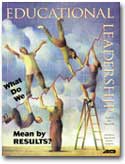Results—what we're all looking for in education. How do we know when we've gotten there? Tour the Internet for first-rate resources on student achievement and program evaluation.
Research and Evaluation
RAND Education (www.rand.org/centers/education) has researched performance issues for more than 10 years. Their studies "suggest that testing can best serve as a partner to reform, not its primary engine."
At www.nwrel.org, the site of the Northwest Regional Educational Laboratory, click "Assessment and Evaluation Program" to find an Assessment Resource Library and tools for assessing oral communication, reading, and writing. Check out the School Improvement area.
Mid-continent Research for Education and Learning (www.mcrel.org) is a source of information about standards, instruction, and assessment. Its Early Literacy Advisor is a computerized system that helps teachers assess and teach young children. "A Theory-Based Meta-Analysis of Research on Instruction" includes reports of 100 studies. For the North Central Regional Laboratory's Web site, bookmark www.ncrel.org. Click "Curriculum, Instruction, and Assessment," then "Literacy Research and Best Practices."
At the site of the Laboratory for Student Success (www.temple.edu/LSS), click "Comprehensive School Reform," then "Achieving Student Success: An Interactive Online Tool" for decision-making tools and a research-based handbook on school reform.
The Learning First Alliance, a collaboration of 12 organizations including ASCD, is highlighted at www.learningfirst.org. Its first goal is "to ensure that high academic expectations are held for all students."
At the Education Trust's site, www.edtrust.org, click "Community Compacts for Student Success" and read about "Standards In Practice (SIP)."
The ASCD Assessment Consortium recently launched a Web site, www.aconsortium.org, to share effective practices from its members' extensive work in performance assessment.
Assessment Help
Start at the ERIC Clearinghouse on Assessment and Evaluation (http://ericae.net), featuring assessment FAQs, definitions, and links to data, including demographics, subject areas, and educational levels. Read test descriptions and follow links to sources for online testing and organizations working for fairness and equity in testing.
A helpful site is Developing Educational Standards, organized by Putnam Valley Schools in New York (http://putwest.boces.org/Standards.html).
For a site featuring research in the achievement of at-risk children, visit the Center for Research on the Education of Students at Risk, www.csos.jhu.edu/crespar/crespar.html. Find information on students with special needs at the Council for Exceptional Children (www.cec.sped.org). Link to the ERIC Clearinghouse on Disabilities and Gifted Education or key in http://ericec.org.
The National Assessment Governing Board sets policy for the National Assessment of Educational Progress and oversees the development of the proposed Voluntary National Tests. Read about those tests at www.nagb.org, then go to the Nation's Report Card at http://nces.ed.gov/nationsreportcard/site/home.asp.
At the TIMSS Benchmarking project (www.timss.org), compare state or district math and science achievement with that of 40 countries. At www.iea.nl, click "Studies" to learn about international studies sponsored by the International Association for the Evaluation of Educational Achievement.
